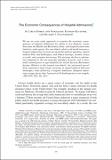The Economic Consequences of Hospital Admissions
Author(s)
Dobkin, Carlos; Notowidigdo, Matthew J.; Finkelstein, Amy; Kluender, Raymond Peter
Downloadaer.20161038.pdf (983.5Kb)
PUBLISHER_POLICY
Publisher Policy
Article is made available in accordance with the publisher's policy and may be subject to US copyright law. Please refer to the publisher's site for terms of use.
Terms of use
Metadata
Show full item recordAbstract
We use an event study approach to examine the economic consequences of hospital admissions for adults in two datasets: survey data from the Health and Retirement Study, and hospitalization data linked to credit reports. For non-elderly adults with health insurance, hospital admissions increase out-of-pocket medical spending, unpaid medical bills, and bankruptcy, and reduce earnings, income, access to credit, and consumer borrowing. The earnings decline is substantial compared to the out-of-pocket spending increase, and is minimally insured prior to age-eligibility for Social Security Retirement Income. Relative to the insured non-elderly, the uninsured non-elderly experience much larger increases in unpaid medical bills and bankruptcy rates following a hospital admission. Hospital admissions trigger fewer than 5 percent of all bankruptcies in our sample.
Date issued
2018-02Department
Massachusetts Institute of Technology. Department of EconomicsJournal
American Economic Review
Publisher
American Economic Association
Citation
Dobkin, Carlos, Amy Finkelstein, Raymond Kluender, and Matthew J. Notowidigdo. “The Economic Consequences of Hospital Admissions.” American Economic Review 108, no. 2 (February 2018): 308–352. © 2018 American Economic Association
Version: Final published version
ISSN
0002-8282